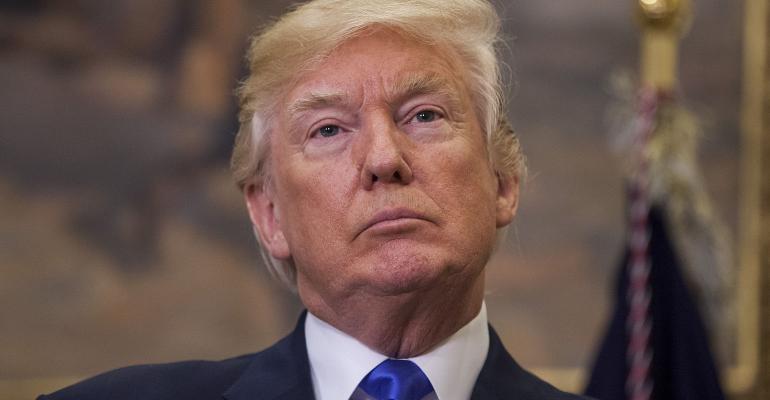By Neil Dutta
(Bloomberg Prophets) -- Immediately after the U.S. presidential election in November, market commentators described the rise in equity prices and Treasury note yields as the “Trump Trade.” The idea was that favorable policies from Washington in the form of lower taxes, deregulation and infrastructure spending would boost growth and corporate profits. Since then, with the prospects for aggressive fiscal policy fading, a number of high-profile commentators have argued that U.S. equities are poised for a big drop.
However, this narrative assumes that fiscal policy expectations are pushing up stocks. This is a flawed assumption. The driver of higher stock prices can largely be traced to stronger corporate earnings and economic data.
To start, let’s assume that stock prices are a function of three factors: corporate earnings, risk-free interest rates and the equity-risk premium, or excess return that investing in equities provides over Treasuries.
Decomposing stock returns over the last year, our analysis shows that earnings growth is responsible for most of the appreciation in equities. While analysts assessed the potential impact on earnings from potential corporate tax changes, the recovery in corporate earnings was underway well before the election. The S&P 500 has posted an average gain of 1.6 percent a month over the last 12 months. The contribution from earnings has been 1.5 percent on average a month. Treasury yields have climbed, acting as a drag on stock prices. However, this drag has been largely offset by a lower risk premium. That’s not especially surprising given stronger investor optimism.
Moreover, while the recovery in U.S. stocks has been impressive, stock markets have been on a tear around the world. In dollar terms, the S&P 500 has underperformed benchmark stock indexes in Japan, South Korea, India, the euro area and major economies in Latin America. Investors like stocks generally, not just those traded in the U.S. That makes it less likely that U.S. equity prices are being held up by expectations of fiscal policy developments.
We can analyze the drivers of U.S. stock prices in a more systematic way. For all the pronouncements about “fake news” this year, it is important to remember that most Americans scan news headlines, typically not reading the whole article. So, we performed a study using Bloomberg.
Specifically, we looked at the end-of-day headlines from the Bloomberg News U.S. stock market wrap for every trading session. We then sorted each headline into one of six categories: (1) corporate earnings, (2) U.S. economic data, (3) geopolitical risk, (4) Federal Reserve, (5) Washington, (6) global developments. We assumed that the stock market moved on a given day solely for our coded reason and we skipped days that did not fall neatly into one of our categories.
Our results can be found in the figure below. We took a rolling sum for each category. For example, we found that geopolitical risks had shaved off 90 points this year. Notice that most of the improvement in U.S. stocks can be ascribed to U.S. data and corporate earnings. This should not be that surprising, as U.S. economic data surprises have generally been positive this year.
On the other hand, Washington has been, at best, a neutral factor for stocks.
Yes, as our figure shows, Washington has been more of tailwind lately as Republicans made progress in pushing tax legislation into law. However, consider the big Washington-related declines earlier in the year. The S&P 500 plunged about 44 points in mid-May after the memos written by FBI Director James Comey surfaced. In late-July, markets sold off as the Republican health-care repeal effort collapsed. Markets plunged the following month after President Donald Trump’s CEO advisory councils were disbanded. Each of these episodes likely cast doubt over whether the president’s agenda would ever come into being.
The news headline analysis is a reminder that first, if you are right about the outlook for earnings and the economy, chances are those views will pay off in the end. Second, because Washington has not been much of a tailwind for stocks, our sense is that if the Republicans are able to push tax legislation through, the market probably will rally modestly. Finally, geopolitical risks -- largely due to tensions with North Korea -- have been an important drag on U.S. equities this year. It is plausible that much of the downside is already priced into the stock market.
This column does not necessarily reflect the opinion of the editorial board or Bloomberg LP and its owners.
Neil Dutta is the head of economics at Renaissance Macro Research, respodnibel for analyzing global trends and cross market investment themes.
To contact the author of this story: Neil Dutta at [email protected] To contact the editor responsible for this story: Max Berley at [email protected]
For more columns from Bloomberg View, visit Bloomberg view





